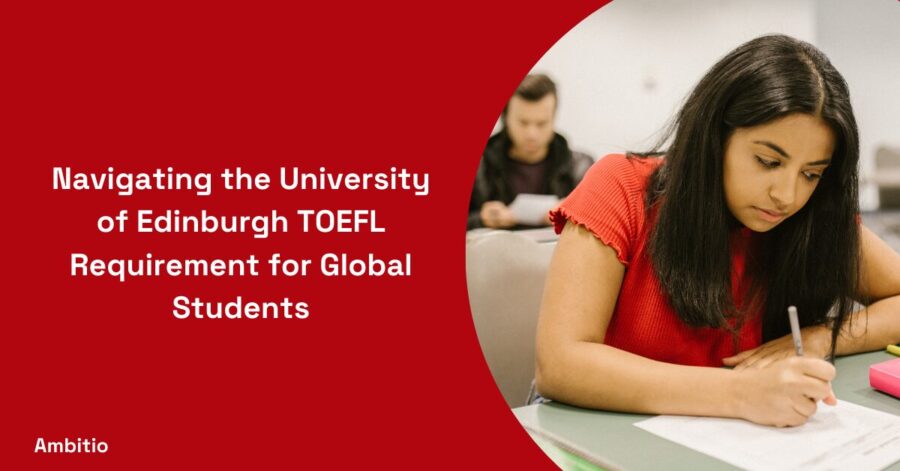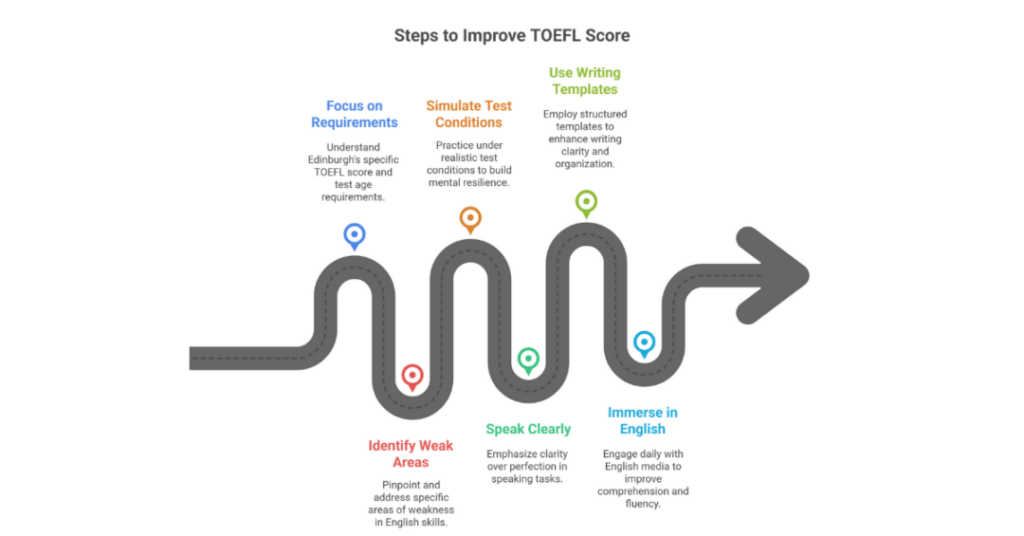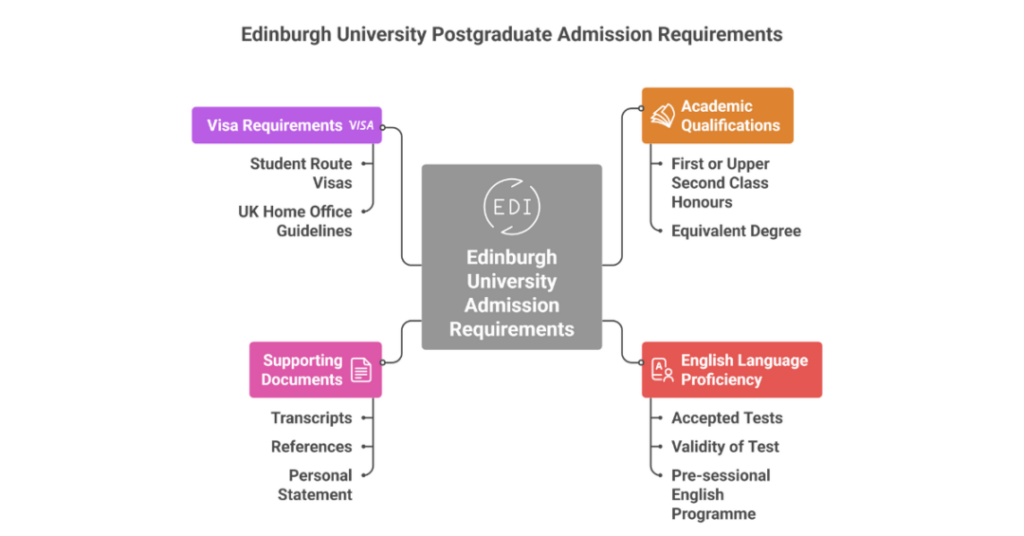26 September 2025
6 minutes read
What is The Edinburgh University TOEFL English Language Requirements?

Key Takeaways
- Meeting the Edinburgh University TOEFL requirement, an overall score of 92 with at least 20 in each section, is essential for non-native speakers; ensure your scores are valid within two years of your programme’s start date.
- If you fall short, focus on improving weak areas, simulate real test conditions, and explore English language programmes as preparation for degree entry.
- Edinburgh requires proof of English language proficiency unless you’re from a majority English speaking country. Double-check accepted qualifications to avoid delays.
You’ve probably Googled “University of Edinburgh TOEFL requirements” more times than you’d like to admit, hoping for a straightforward answer. Instead, you’re met with pages of jargon that make you question if you’re applying to study or signing up for a secret society. Sound familiar? Yeah, we’ve all been there, staring at requirements like “tests no older than two years from the beginning date” and thinking, “Do they really need it to be this complicated?”
The truth is, Edinburgh’s English language requirements aren’t just red tape; they’re designed to ensure you’ll thrive once you’re there. But between worrying if your TOEFL scores meet the level of English language competency they demand and figuring out which English-language qualifications we accept, it’s easy to feel overwhelmed. That’s why we’re breaking it all down, no fluff, no confusion, just the real information you need to move closer to your dream degree programme. Let’s simplify this, together.
What are the Edinburgh University TOEFL English Language Requirements?
For most programmes, the University of Edinburgh requires a TOEFL-iBT score of at least 92 overall, with minimum 20 in each section (Reading, Listening, Speaking, Writing). Some competitive or specialised programmes may ask for higher scores (e.g., 100).
| Level / Programme Type | TOEFL (iBT) Required | Section Minimums | Expiry / Validity | Notes / Variations |
|---|---|---|---|---|
| Undergraduate (general) | 92 | 20 in each section | Test must be less than 2 years old | Medicine, Veterinary and some courses may require higher scores |
| Postgraduate (general) | 92 | 20 in each section | Test must be less than 2 years old | Some postgraduate programmes require higher scores (up to 100) |
| Business / MBA / Competitive programmes | 100 | 20 in each section | 2 years | MSc Finance, MBA and similar courses often ask for TOEFL 100 |
| English / Arts & Humanities (CAHSS) | 92 | 20 in each section | 2 years | Some courses in business/arts may require TOEFL 100 |
| PhD / Research (some areas) | 92 | 20 in each section | 2 years | Certain research programmes may set higher thresholds |
How to Improve TOEFL Score to Reach Entry Requirements for Edinburgh University?
Getting into a world-class university like the Edinburgh University isn’t just about ambition; it’s about proving you demonstrate a level of English that will enable you to succeed in your degree. If you’re applying to study there, meeting their English language test requirements, whether it’s TOEFL, IELTS, or Trinity ISE, is non-negotiable.

So, if your scores fall short, what do you do? Don’t panic, here’s how to take realistic, focused steps to improve your performance.
Focus on What Edinburgh Actually Wants
Edinburgh accepts several English language tests we accept, but the scores have to meet specific standards. For TOEFL, the test must be no older than two years old from the start date of your course. So, if your test scores are half years old or outdated, you need to provide a fresh one. Check the requirements early so you can target the scores that enable you to succeed.
Get Laser-Focused on Weak Areas
Improving your score isn’t about aimlessly practicing; it’s about attacking your weaknesses. Is your writing too disorganized? Are you stumbling through the speaking tasks? Pinpoint where you’re losing points. The faster you fix the gaps, the closer you’ll get to Edinburgh’s entry requirements.
Create Real Test-Day Conditions
Test day isn’t a surprise party; it’s predictable, so train for it. Practice under TOEFL-specific timing, no breaks, no distractions. This approach helps you prepare mentally for pressure and ensures you don’t run out of steam halfway through the English language test.
Speak Clearly, Not Perfectly
When it comes to the speaking section, remember: clarity wins. Examiners don’t care if you sound like a Hollywood actor. Instead, organize your thoughts, speak naturally, and avoid long pauses. Your goal is to demonstrate a level of English competency; perfection isn’t required.
Use Writing Templates to Stay Structured
If writing feels like your weakest link, pre-plan. Use a simple template: an introduction, 2-3 strong points, and a conclusion. This ensures your answers are clear, concise, and meet the standards Edinburgh expects in its degree programme applicants.
Immerse Yourself Daily
Learning to think in English will help you succeed in your studies and improve faster. Surround yourself with podcasts, books, and shows that challenge your listening and reading skills. Real immersion helps you retain what you learn regardless of your nationality or country of residence.
Which Programmes Require English Language Qualifications?
Unless you are a national of a majority English speaking country as defined by UK Visas and Immigration, you must submit an English language certificate like TOEFL, IELTS, or another accepted qualification. These requirements aren’t just formalities; they ensure that your academic English skills enable you to succeed in your programme.
If you haven’t already met our English language entry requirements, universities also accept satisfactory completion of pre-sessional English language programmes as preparation for degree entry. Here’s a look at the top 10 programmes in the UK and USA:
| Programme | Top Universities (UK) | Top Universities (USA) | Average Tuition Fees (Per Year) |
|---|---|---|---|
| Business Administration (MBA) | London Business School, University of Oxford | Harvard University, Stanford University | £45,000 – £60,000 / $60,000 – $80,000 |
| Computer Science | University of Cambridge, Imperial College London | MIT, Carnegie Mellon University | £30,000 – £40,000 / $50,000 – $70,000 |
| Law | University of Oxford, University College London (UCL) | Yale University, Harvard University | £20,000 – £30,000 / $45,000 – $65,000 |
| Medicine | Edinburgh University, University of Glasgow | Johns Hopkins University, Stanford University | £35,000 – £50,000 / $50,000 – $70,000 |
| Data Science and AI | Edinburgh University, University of Southampton | MIT, University of California, Berkeley | £25,000 – £35,000 / $40,000 – $65,000 |
| Engineering | University of Cambridge, University of Manchester | Massachusetts Institute of Technology (MIT), Caltech | £25,000 – £40,000 / $40,000 – $70,000 |
| International Relations | London School of Economics (LSE), University of Warwick | Georgetown University, Princeton University | £20,000 – £28,000 / $45,000 – $60,000 |
| Finance | University of Oxford, University of Edinburgh | University of Chicago, Wharton School (UPenn) | £30,000 – £45,000 / $50,000 – $70,000 |
| Architecture | University College London (UCL), University of Bath | Harvard University, University of California, Berkeley | £25,000 – £38,000 / $45,000 – $65,000 |
| Biotechnology and Life Sciences | University of Cambridge, Edinburgh University | Stanford University, MIT | £28,000 – £40,000 / $50,000 – $70,000 |
What are the Edinburgh University Admission Requirements For Postgraduate English Courses?
If you’re looking to study at the University of Edinburgh for a postgraduate degree, you’ll need to meet specific academic and English language entry requirements. Whether your course is taught and assessed in English or involves research, the university ensures all applicants demonstrate a level of readiness to succeed academically.
Regardless of your nationality, if you’re not from a majority English speaking country as defined by UK Visas and Immigration, you must submit proof of your English language ability. You’ll need to meet the English language proficiency requirements by providing an English language certificate like TOEFL or IELTS.

If you’ve already met our English language standards through prior study, such as an International Baccalaureate or a degree in an English speaking country, you may not need to take an English language test again. The summary of the key admission requirements are listed below:
| Requirement | Details |
|---|---|
| Academic Qualifications | A first or upper second class honours degree (2:1) or equivalent. |
| English Language Proficiency | English language qualification must demonstrate a level of standards (e.g., IELTS 6.5 or TOEFL iBT 92). |
| Accepted Tests | TOEFL, IELTS, Cambridge C1 Advanced, Trinity ISE, or other qualifications meet standards. |
| Validity of English Test | Test results must be no older than two years from the start date of the degree. |
| Pre-sessional English Programme | Offered if you need English language programmes as preparation for degree entry. |
| Certified Translations | Need to submit a certified translation of non-English documents. |
| Students from Majority English Countries | Unless you are a national of a majority English-speaking country, no further test is required. |
| International Foundation Programmes | Accepted for students who do not meet direct academic English requirements. |
| Supporting Documents | You also need to submit transcripts, letters of reference, personal statement, and proof of language skills. |
| Visa Requirements | Meet minimum standards for student route visas as per the UK Home Office sets guidelines. |
| Age of Prior Qualifications | Previous degrees must be less than three and a half years old at the start date of the programme. |
Conclusion
Securing a place at the University of Edinburgh for a postgraduate programme requires more than just ambition; it demands preparation and focus. From ensuring your degree must be included in their list of accepted qualifications to meeting the English language proficiency requirements, every step is designed to set you up for success.
If you don’t meet the minimum standards for applicants, options like programmes as preparation for course entry, including pre-sessional English language programmes, can help you bridge the gap.
Remember, whether you’re meeting the following grades or higher or checking if a higher level is specified for your course, understanding Edinburgh’s standards is critical. The UK Home Office sets its own minimum standards, and these standards for applicants who require student route visas are non-negotiable.
Choose Ambitio for a seamless Study in UK experience! Discover 270 colleges, connect with 118,000 Indian students, and explore renowned courses. Immerse yourself in the UK’s academic vibrancy. Begin your journey now – Study in UK with Ambitio.
FAQs
What is the minimum TOEFL score required for admission to the University of Edinburgh?
The minimum TOEFL score varies based on the program and study level. Prospective students should consult the university’s official website for accurate information.
Are there different English language requirements for undergraduate and postgraduate programs?
Yes, postgraduate programs typically have higher English language requirements than undergraduate programs.
Can previous education in English waive the TOEFL requirement?
Applicants who have been educated in a majority English-speaking country or in a program taught and assessed in English may meet the language requirements.
Does the University of Edinburgh offer English language support?
Yes, the university offers various English courses and a Pre-sessional English Programme for students who need to improve their English skills.
Are IELTS scores accepted as an alternative to TOEFL?
Yes, the University of Edinburgh accepts IELTS scores as an alternative to TOEFL.

You can study at top universities worldwide!
Get expert tips and tricks to get into top universities with a free expert session.
Book Your Free 30-Minute Session Now! Book a call now




























